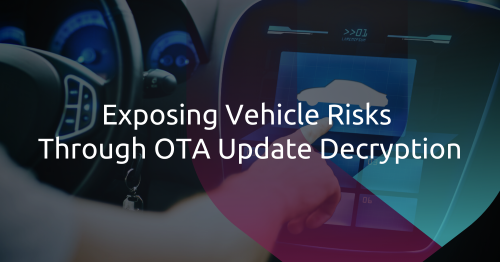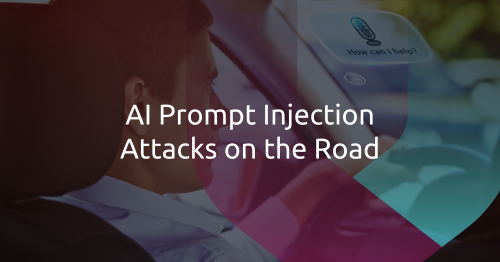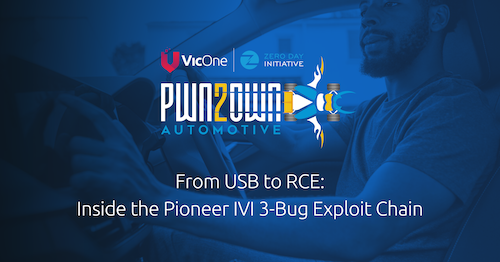
Mapping the Connected Car’s Attack Surface: An OSINT Framework for Automotive Threat Intelligence
August 28, 2025In this blog, we present a systematic OSINT-driven methodology, one that aligns with the Auto-ISAC Automotive Threat Matrix (ATM) and is tailored for automotive threat intelligence. This approach enables security researchers and car manufacturers to map the continually expanding attack surface of connected vehicles.
 CyberThreat Research Lab
CyberThreat Research Lab
Electric Vehicle Charger Security Risks: How Vulnerabilities Could Lead to Fire Hazards
August 26, 2025At Black Hat USA 2025, security researchers revealed how vulnerabilities in EV chargers could cause charging cables to overheat and burst into flames. Their findings underscore the urgent need for stronger safeguards and hardware protection to ensure the safety of these devices.
 CyberThreat Research Lab
CyberThreat Research Lab
From Pwn2Own Automotive 2025: Unpacking the Tesla Wall Connector Exploit Chain and Its Broader Cybersecurity Implication
August 5, 2025We analyze the exploit chain used against the Tesla Wall Connector EV charger at Pwn2Own Automotive 2025, mapping it to the Automotive Threat Matrix and exploring its broader implications for automotive cybersecurity.
 CyberThreat Research Lab
CyberThreat Research Lab
Phishing Beyond Emails: How Compromised Installers Threaten Automotive Software Supply Chains
July 23, 2025We examine how a signed Windows installer was used to deploy Redline Stealer malware, successfully bypassing traditional defenses. The incident reveals critical blind spots in automotive cybersecurity and highlights the need for zero-trust principles across the entire software supply chain.
 CyberThreat Research Lab
CyberThreat Research Lab
CVE-2025-6019: A Privilege Escalation Flaw With Implications for AGL and the Future of SDVs
June 25, 2025A recently disclosed Linux flaw shows how seemingly ordinary bugs are starting to affect software-defined vehicles (SDVs). We unpack CVE-2025-6019, its impact on Automotive Grade Linux (AGL), and what it means for in-vehicle cybersecurity.
 CyberThreat Research Lab
CyberThreat Research Lab
Replicating RAMN Using a Single STM32 Board: A Hands-On Exploration
May 26, 2025Replicating the core functions of a full-scale Resistant Automotive Miniature Network (RAMN) using just a single STM32 board is a practical, cost-effective way to dive into advanced in-vehicle networking. In this hands-on guide, we run through the step-by-step setup, enabling engineers and enthusiasts alike to prototype resilient automotive communication systems with minimal hardware.
 CyberThreat Research Lab
CyberThreat Research Lab
LockBit Ransomware Group Data Leak: Implications for Automotive Cybersecurity
May 21, 2025A recent breach of the LockBit ransomware group exposed chat logs, offering a rare inside look at how victims were targeted and extorted. Automotive companies featured prominently among those attacked. We unpack the key findings and outline practical steps that automotive companies can take to block LockBit attacks or similar incidents.
 CyberThreat Research Lab
CyberThreat Research Lab
Exposing the Risks: Security Takeaways From a Successful Android OTA Decryption
May 13, 2025By decrypting an Android OTA update to their vehicle’s infotainment system, a researcher gained access to proprietary code. We examine the method that the researcher used and what it means for modern vehicle security.
 CyberThreat Research Lab
CyberThreat Research Lab
Invisible Commands, Real Consequences: AI Prompt Injection in Vehicle Systems
May 2, 2025As AI assistants become standard features in vehicles, new risks like prompt injection are emerging, quietly manipulating systems through seemingly harmless inputs. We explore how attackers could exploit invisible commands in everyday interactions and why securing AI at the input level is critical to automotive safety.
 CyberThreat Research Lab
CyberThreat Research Lab
Hitag2 Key Fob Vulnerability: How Attackers Can Clone Keys in Under a Minute
April 15, 2025Hitag2, a legacy key fob system, has long been known to carry security flaws. A recent demonstration showed that it could be cracked in under a minute. We break down how the attack works and why outdated encryption poses serious risks to modern vehicles.
 CyberThreat Research Lab
CyberThreat Research Lab
Breaking Down the Pioneer IVI System 3-Bug Exploit Chain From Pwn2Own Automotive 2024
March 31, 2025We analyze the three-bug exploit chain demonstrated by security researchers against the Pioneer DMH-WT7600NEX IVI system at Pwn2Own Automotive 2024. We map it to the Automotive Threat Matrix and highlight industry best practices for mitigating similar exploits.
 CyberThreat Research Lab
CyberThreat Research Lab
Shifting Gears for 2025: The Next Generation of Automotive Cybersecurity Challenges
March 19, 2025As AI, EVs, and SDVs reshape the automotive industry, cyberthreats are evolving in tandem. Drawing from VicOne’s 2025 automotive cybersecurity report, this article offers key insights into the industry’s threat landscape and outlines the strategies automakers need to stay ahead.
 CyberThreat Research Lab
CyberThreat Research Lab
